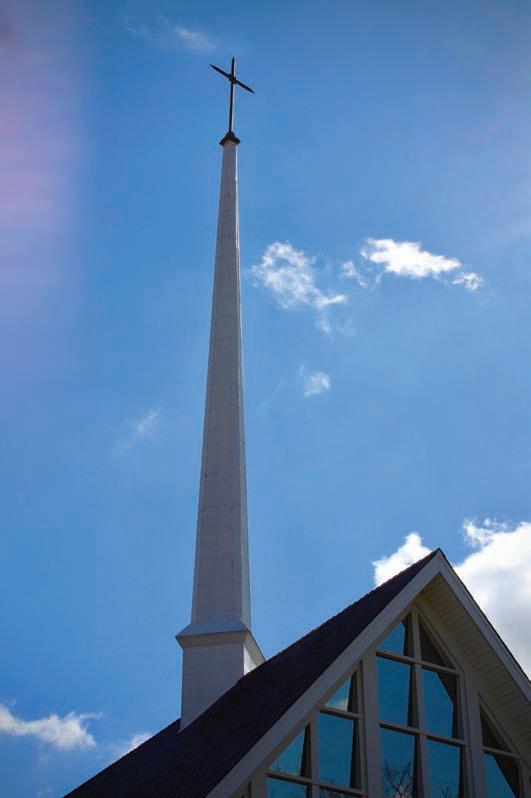
4 minute read
Are You There, God?
FUSION SPRING 2020
Are You There,
Advertisement
God?
Where Worship Meets The Community
Words by Moira Armstrong and Angela Molina Photos by Amanda Stayer

T here is a common misconception that the LGBTQ+ community and religion are like oil and water – they do not mix. A survey by the Pew Research Center found that 29% of respondents have been made to feel unwelcome in a place of worship because they are LGBTQ+.
Despite this, a 2014 Gallup poll found that 49% of LGBTQ+ adults considered religion to be an important part of their lives. Like cisgender, heterosexual individuals, LGBTQ+ people may choose a religious path for any number of reasons, including spiritual fulfillment and a sense of community.
Fusion writers spoke to several local faith-based organizations, including local places of worship and Kent State student organizations. Here is what they have to say.
“A survey by the Pew Research Center found that 29% of respondents have been made to feel unwelcome in a place of worship because they are LGBTQ+”

FUSION SPRING 2020
Hillel

While the Jewish faith approaches LGBTQ+ issues in many ways, Rabbi Michael Ross, the senior Jewish educator for Hillel at Kent State, says that “the primary ideal” upheld in Judaism is to “remember that oppression is always terrible.” In remembrance of the faith’s history of deliverance from Egypt, he says that the Jewish faith attempts to acknowledge and affirm other marginalized groups.
Ross says there are several LGBTQ+ synagogues in the United States that “sit at the cutting edge of creativity and artistry” and “push new ways of understanding Jewish prayer … and ritual.” One such attempt at understanding, Ross says, is the adaptation of Jewish wedding ceremonies to include same-sex couples. According to the Human Rights Campaign, Reform Judaism, which is the largest Jewish denomination in the United States, has been practicing same-sex weddings since 2000.

United Church of Christ
“Open and affirming” is how Church Administrator Leah Davis describes the Kent United Church of Christ’s stance and atmosphere in regards to the LGBTQ+ community. After the national United Church of Christ, which is a denomination of Christian Protestantism, adopted this policy in 1985, the local association of churches decided to as well.
“Not every church follows it,” Davis says, but Kent UCC has embraced the ideology. The church has had LGBTQ+ members, leaders on councils and committees and even programming, as the Kent PFLAG chapter meets there.
Black Squirrel Coven
Black Squirrel Coven, Kent State’s student organization for those who practice paganism, Wicca and witchcraft, is in a unique situation: The organization has no established policy on LGBTQ+ issues or members, but there is only one official straight member in the on-campus organization.

“We’re pretty much all in the community, so we just welcome everybody,” says Phoenix Leach, a sophomore zoology major and the organization’s president. “There’s a lot of inclusivity.”
Latter-Day Saint Student Association
The Latter-Day Saint Student Association (LDSSA), a Kent State student organization, is based upon the Church of Jesus Christ of Latter-Day Saints. LDSSA supplements students’ secular education with religious lessons from missionaries associated with the Church.
LDSSA President Devin Gilbert says, “Our Church doctrine is that everyone is welcome and that every single one of us is a child of God.”
Despite this, traditionally, the Church has not supported LGBTQ+ rights and only recognizes marriage between a man and a woman. Official policy states that LGBTQ+ individuals who wish to remain in the Church must be celibate. However, the New York Times reports that a 2019 policy change allows children of same-sex couples to be baptized into the Church, though the Church will continue to not recognize same-sex marriages. Affirmation: LGBTQ Mormons, Families, and Friends is a national organization for LGBTQ+ individuals and allies who are members or former members of the Church. This organization is not affiliated with the Church.
Leach says they try to provide a safe space to celebrate and practice often-judged belief systems, as well as educate their members.
University Parish Newman Center
The Human Rights Campaign reports that the Catholic Church does not formally accept the LGBTQ+ community. Same-sex marriage is not recognized, relationships are discouraged and gender is considered assigned at birth.
However, Veronica Victoria, a campus ministry intern at the University Parish Newman Center, explains that her approach is based on John 13:34 - “As I have loved you, so you must love one another.” While she did not know specifically of church members or leaders who are part of the community, she noted that other churches might and that she would welcome and support anyone who followed church creed. If there was a need, she would also consider creating programming on LGBTQ+ issues, she says.




